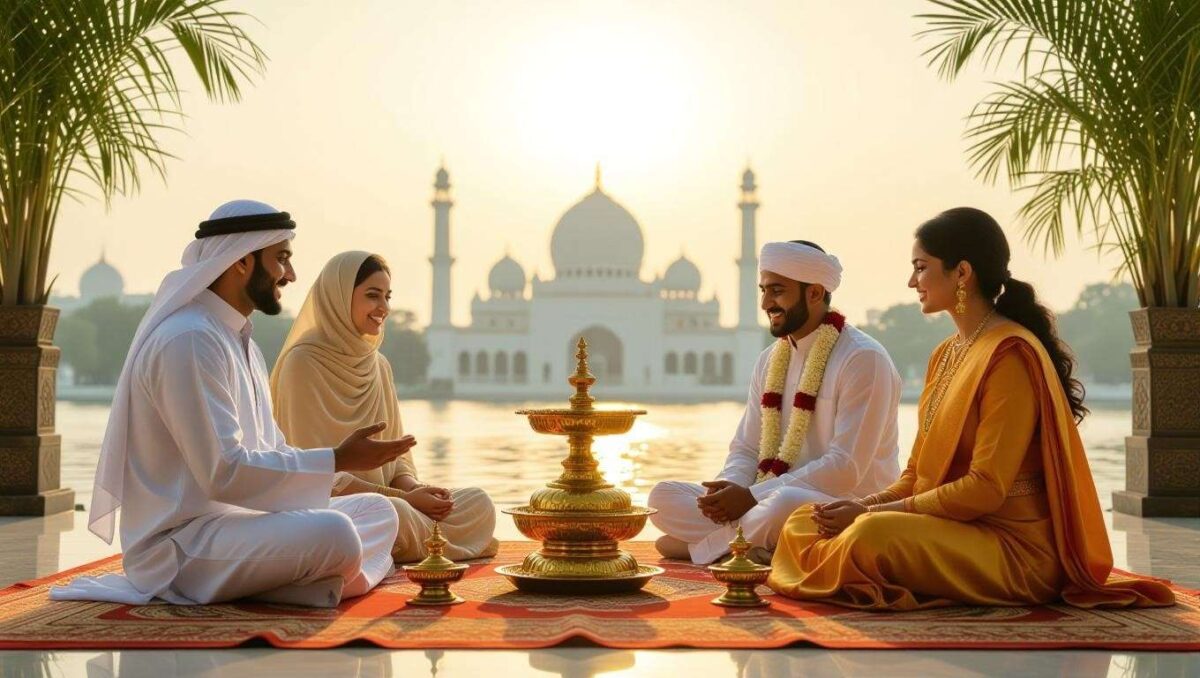Onam, a vibrant harvest festival celebrated predominantly in Kerala, India, holds deep cultural significance for Malayalis. While the festivities are marked by floral decorations, traditional dances, and communal feasts, the question arises: should Muslims partake in these celebrations? This article delves into the Islamic perspective on participating in Onam, examining religious teachings, scholarly opinions, and cultural considerations.
Understanding Onam: Origins and Significance
Onam is a ten-day Hindu festival that commemorates the mythical return of King Mahabali, a benevolent ruler who, according to legend, visits his people annually. The festival includes rituals such as worshiping Lord Vamana, the dwarf incarnation of Lord Vishnu, and is deeply rooted in Hindu religious practices .
Islamic Teachings on Celebrating Non-Islamic Festivals
Prohibition of Celebrating Non-Islamic Religious Festivals
Islamic teachings emphasize the importance of adhering to monotheism and avoiding practices that could lead to polytheism (shirk). Participating in religious festivals that honor deities other than Allah is considered impermissible. The Prophet Muhammad (peace be upon him) said:
“Whoever imitates a people is one of them.”
— Abu Dawood
This hadith underscores the importance of maintaining distinct Islamic identity and avoiding practices that could blur religious boundaries.
Emphasis on Distinct Islamic Identity
The Quran advises Muslims to uphold their unique religious identity and not to adopt the practices of other faiths:
“For you is your religion, and for me is my religion.”
— Quran 109:6
This verse highlights the importance of preserving one’s religious practices and not engaging in rituals that are not part of Islamic tradition.
Scholarly Opinions on Participating in Onam
Islamic scholars have expressed concerns about Muslims participating in Onam due to its religious origins and practices. A teacher in Kerala was suspended for advising Muslim students not to partake in Onam celebrations, labeling the festival as “polytheistic” and “un-Islamic”.
While some argue that Onam has become a cultural festival, the underlying religious elements remain, making participation contentious from an Islamic standpoint.
Cultural Considerations and Community Practices
In Kerala, Onam is celebrated with various cultural activities, including floral designs (Pookalam), traditional dances, and communal feasts. While these aspects may appear secular, they are intertwined with religious rituals that honor deities, making them incompatible with Islamic teachings.
The Syro-Malabar Church has clarified that Onam is viewed as a cultural festival by Keralites, encompassing feasts, floral decorations, and performances that symbolize love and brotherhood . However, from an Islamic perspective, engaging in such practices could be seen as endorsing polytheistic traditions.
Alternatives for Muslims During Onam
Muslims are encouraged to maintain their religious identity and avoid participating in non-Islamic religious festivals. Instead, they can focus on Islamic practices and community activities that align with their faith.
Suggested Activities:
- Engage in Islamic Worship: Increase acts of worship, such as offering additional prayers (Nafl), reciting the Quran, and engaging in Dhikr (remembrance of Allah).
- Community Service: Participate in charitable activities, such as feeding the needy, supporting orphanages, and contributing to community welfare projects.
- Educational Pursuits: Dedicate time to Islamic studies, attend lectures, and engage in discussions that enhance understanding of the faith.
- Family Bonding: Spend quality time with family, reinforcing Islamic values and nurturing strong relationships.
Conclusion: Upholding Islamic Values
While Onam is a significant cultural festival for many, Muslims are advised against participating due to its religious origins and practices that conflict with Islamic teachings. By focusing on activities that align with Islamic principles, Muslims can uphold their faith and contribute positively to their communities.
FAQs
A1: No, participating in the Onam feast is not permissible as it is associated with religious rituals that honor deities other than Allah, conflicting with Islamic teachings.
A2: While Onam has cultural aspects, its religious origins make it incompatible with Islamic practices, and Muslims are advised against participating.
A3: No, there are no exceptions. Engaging in practices that honor deities other than Allah is considered impermissible in Islam.
A4: Muslims should focus on Islamic worship, community service, educational pursuits, and family bonding during Onam.
A5: Consult with local Islamic scholars, read Islamic jurisprudence books, and visit reputable Islamic websites for more information.









